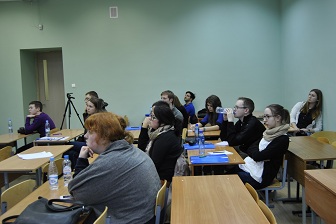Videos of the Public Lectures during the International Week
Public lecture by Prof. Raymond Taras "The politics of fear and the making of foreign policy: case studies fom Europe"
Public lecture by Prof. Eduard Ponarin "Happiness in Russia in Comparative perspective"
Public lecture by Associate Prof. Simo Mikkonen "History as interpretation: from national to transnational history"

For those who didn't have an opportunity to participate in the public lectures during the International week in Saint-Petersburg the videos of the sessions are now available.
Politicial science:
Today’s politics of fear is not only about top-down elite manipulation of citizens but especially in Europe, bottom-up mobilization of swathes of society against a political establishment viewed as championing hyper-diversity. A key issue in the study of xenophobia is how citizens’ fears of foreigners living within a state can be converted into antipathy towards foreign nations and, in turn, hostile foreign policy towards perceived adversaries. This lecture looks critically at the role of fear in contemporary politics applying theories from social psychology and psychoanalysis. Case studies include France's alleged Islamophobia in domestic and international contexts, Poland's Russophobia at home and abroad, and Sweden's phobia of phobias - its efforts at political correctness at home and internationally. If paranoia partly shapes foreign policies, what can be done to eliminate it?
Sociology :
Public lecture by Prof. Eduard Ponarin "Happiness in Russia in Comparative perspective"
+Presentation of the Laboratory for Comparative Social Research
History:
Public lecture by Associate Prof. Simo Mikkonen "History as interpretation: from national to transnational history"
This lecture will concentrate on the nature of history, discuss how historical knowledge is formed and how it is a result of interpretation rather than given facts. History is always a construction of the past rather than clear facts. This is both a strength, but also a source of several misuses. National historiography has particularly strongly supported political uses of history, still relevant today. One recent development in the historical scholarship that will be discussed in this lecture, is the transcending beyond national borders and limitations. Historical scholarship used to be essentially national, but has recently started to grow beyond empires and nation-states.

